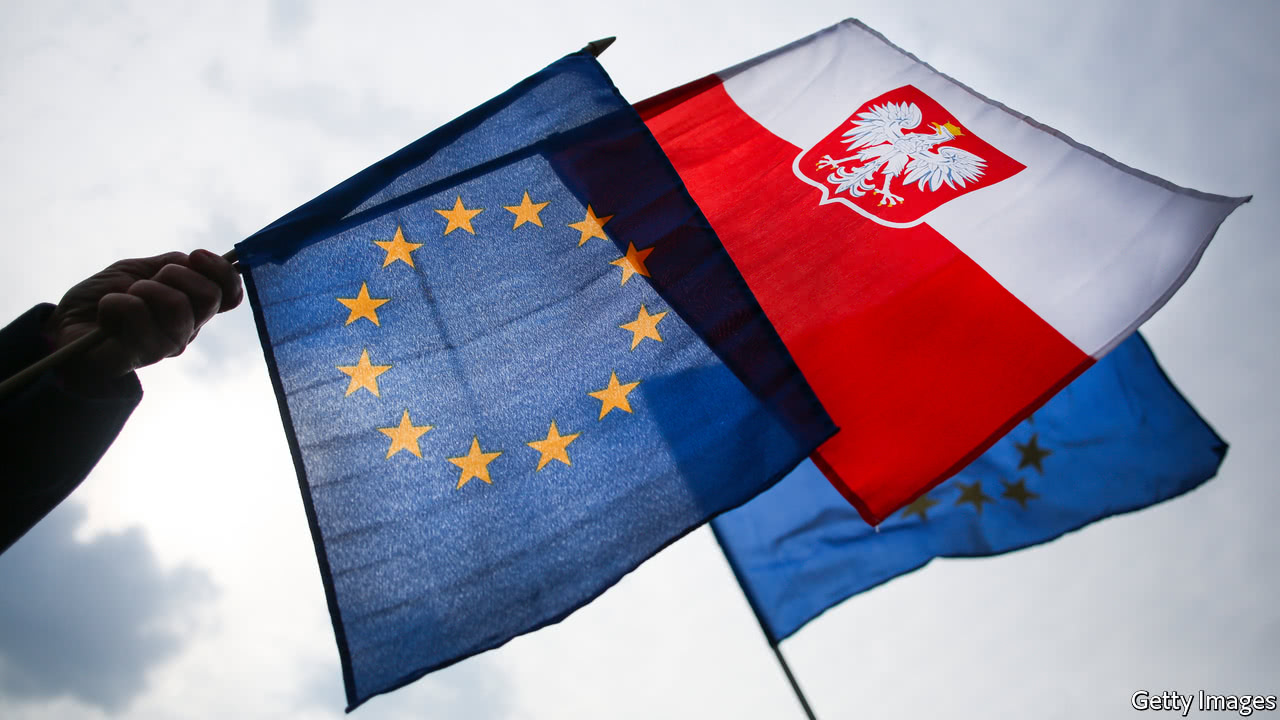Established in 1951 as the European Coal and Steel Community, which created a common economic area in coal and steel, the Union-to-be was foreseen by many political leaders and philosophers as the everlasting post-war political pact of France and Germany but with the added allure of economic prosperity. Forty-two years later with a slow but steady increase in its powers and legal oversight, the European Union was founded in 1993 with the signing of the Maastricht Treaty, the end goal of the post-war peace project. It was this expansionism that was to sound the potential death knell to the EU’s institutional confidence and its citizens’ trust in it despite the enlargement’s strategic importance in post-Soviet Europe.
Chief amongst those newly independent countries of the former Soviet Bloc was Poland, simultaneously one of the EU’s economic success stories yet strong harborer of dissent and euro-skepticism. The EU is now under siege from an authoritarian Polish government in what is the institution’s greatest existential threat since its founding. Poland’s turn to the political ‘dark side’ has been accompanied by unrelenting swathes of diplomatic support from its neighbor Hungary. Are we seeing the EU’s own Brest-Litovsk?
“The EU is now under siege from an authoritarian Polish government in what is the institution’s greatest existential threat since its founding”
In 2004, Poland benefitted from an EU-financed “Marshall Plan”. This money helped the country brush off the 2008 financial crisis and maintain an average GDP growth of 3.24% between 2008 and 2018, an indication of higher living standards and economic growth compared to its pre-EU days. Despite now EU Council President Donald Tusk’s run as Polish prime minister, the seemingly radical transformation in its political culture arguably never shifted. The right-wing PIS (Law and Justice Party) successfully gained both Houses of Parliament and won the presidency in 2015. This is the first time a party has won an outright majority in the Polish legislative branch since the Soviet Union collapse in 1991.
The party holds a eurosceptic and Atlanticist ideological tradition, vehemently opposing EU-federalism while maintaining strong links with the USA. Like in the USA, Poland’s government is partial to flooding its courts with its own partisans as it has done since 2015. Poland’s PIS government has also not held back from firing over 11,000 civil servants and charging its most widely viewed independent news channel TVN24 with a $415,000 fine for its coverage over parliamentary protests in 2016.
These actions flouted Maastricht’s membership prerequisites and the European Commission triggered Article 7 in 2017 to strip Poland of its voting rights. Unfortunately for the EU, Hungary’s prime minister, Viktor Orban’s declaration to veto such a unanimous decision in the presence of the EU’s other 27 members underlines the fundamental flaw of the Union: its disunity. What had previously evolved into an egalitarian premise of EU membership during the European Community’s development became a tragic weak spot in an ever-growing Union. So compelling is the will of the economic bloc of $19.7 trillion that President Trump joined host Poland in Warsaw in 2017 where he received a crowd cherrypicked for his speech at the symbolic Krasinski Square by none other than the PIS government. Ideological twins of the right, Trump’s visit also vindicated Poland’s defiance to the EU’s 2015 refugee relocation initiative, which it immediately shot down along with the infamous anti-migrant ‘defect democracy’ Hungary.
This natural evolution of interstate relations gives rise to the uncomfortable question about the EU. Just as NATO faces a dilemma of relevance in the wake of the Soviet Union’s collapse, so too is the EU finding its ‘economic beneficiaries’ falling out of touch with its political elitism and I-know-best lecturing. The raison d’être of the EU is to maintain long-standing peace on the European continent, something it has managed to do for 73 years – the longest period of peace in European history. Its ostensibly covert purpose, however, the political and judicial integration of EU member states into a supranational body is not shared by all.
It stands to reason that the EU must adapt before it ceases to exist. Straddling an almost impassable East-West divide, the Union must accommodate a broad church of political cultures while delivering economic prosperity and maintaining equal living standards across the bloc. Poland, Hungary, Visegrad and the 3 Seas Initiative’s members will accept nothing less since China rolls out its silk road for those disillusioned with those lectured on liberal democracy and human rights.
In the absence now of any consensus on collective punitive action against members, the Union must focus on the economic argument of membership. As the U.K. leaves the EU, regional structure funds – the lifeblood of many post-Soviet EU members, from which €7 billion Poland claimed last year, and of which 3.3% of Hungary’s GDP currently consists – will be strained. Poland and its ‘flawed democracy’ neighbours need to be convinced of what the EU can do for them, and not be told what they cannot.
George Baines
(Image Credited to The Economist)

